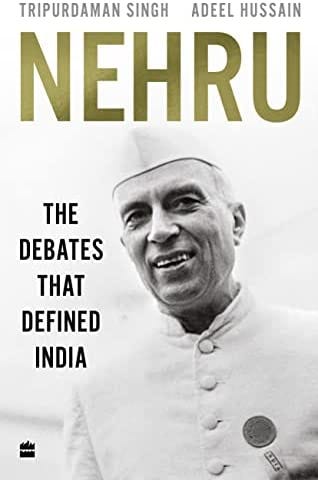Nehru: The Debates that Defined India
by Tripurdaman Singh and Adeel Hussain
In the house of my great-aunt in Pakistan, there is an elaborate family tree tracing the lineage of my family hundreds of years back into the past. Although there were some apocryphal myths about their distant origins being in Iraq and Iran, all of them lived in India and considered solely themselves Indians by identity, Hindustani, as the word then used. My grandparents were the first in our family to leave India, or at least the India that they had known, when they were displaced by the events known as Partition. Two generations later, nothing underlines to me how removed from those origins I am as when, like now, billions of people on the subcontinent, including my extended family, are going crazy over the Cricket World Cup. This odd sport meanwhile leaves me somewhere between bewilderment and indifference. No crossing back over that chasm. At least I can speak the language and cook the food.
That said, I do have an interest in the politics and history South Asia, perhaps because of lingering reasons of identity but also because I find the region fascinating on it s own terms. V.S. Naipaul, also an expatriate, once said that Indians “were the most interesting people he’d ever met.” I can’t think of a better example of an interesting Indian than Jawaharlal Nehru, the country’s first Prime Minister and something of a legend of third world anti-colonialism. This book is a collection of letters that Nehru exchanged with other Indian leaders, Hindu and Muslim, during his political career both during the freedom struggle and after independence. The four people he exchanges correspondence with are the philosopher-poet Muhammad Iqbal, the founder of Pakistan Mohammed Ali Jinnah, fellow Congress Party leader Sardar Patel, and Shyama Prasad Mookerjee of the Hindu Mahasabha, an ideological forerunner of India’s current ruling BJP.
The exchanges were very enlightening. Iqbal, who is someone whose poetry and philosophical writings are dear to my heart, comes across as a completely impractical, head-in-the-clouds religious thinker whom Nehru desperately has to implore to pay attention to the actual material conditions of the country. Jinnah is often blamed for being a sectarian who broke India into pieces, but from his letters it actually seemed that he tried very hard to reach an agreement for Hindu-Muslim unity and it was in fact Nehru’s soaring ego and intransigence that made a compromise impossible. Sardar Patel was a hawk on foreign affairs who was also ceaselessly hostile and suspicious towards Indian Muslims, no doubt contributing to the events that eventually broke the country apart. Mookerjee, I have to say, had a bit of a dull exchange with Nehru about some issues of the Indian constitution which even I was not enough of a nerd to be able to appreciate.
It’s unfortunate the way that religion, which is meant to be a path to coming to know God, can often devolve into a crude form of tribal division and even hatred. So it was in India in the time leading up to Partition. Reading these letters, its really quite clear it didn’t need to be that way. More thoughtful leadership on all sides could have avoided the violent divorce that broke India into separate parts. Nehru also seemed to have been convinced that the world was inevitably secularizing and refused to countenance dealing with Indian Muslims as a separate electorate with its own unique interests since he believed that both Hindus and Muslims would all soon become atheists anyways, and hopefully socialist ones. Nehru was brilliant, worldly, and visionary, but he also was naive when it came to his own countrymen and even India’s neighbors like China, whom he assumed would always support India out of a sense of brotherly Pan-Asianism. That was a big misreading to say the least. Nehru’s personal arrogance wound up harming his country greatly.
I think this book is a must-read for people who are already nerds about South Asian history. It’s an incredible little time capsule from an era when people wrote long and careful letters to each other, and it collects the private thoughts of some of the most important people of that era, both Hindu and Muslim. If you ask me, I don’t think Partition should have happened. Had it not, I would probably be in Hyderabad right now, eating mangoes on my family’s former estate, and paying rapt attention to the Cricket World Cup with my Hindu friends. Instead I’ll settle for the NBA this year.


Just got my hands on a copy. Looking forward to reading this